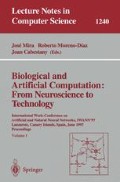Abstract
In this paper we present a self-organizing process for rules obtained from a machine learning system. The resulting map can be interpreted back into the symbolic field in an attempt to make the logical representation of the original rules reflect the relationships codified by map distances. Thus, we improve the quality of the starting set of rules both in classification accuracy and in conceptual clarity.
Preview
Unable to display preview. Download preview PDF.
Bibliography
ALGUERO GARCIA, A., Algoritmos para el tratamiento de reglas aprendidas a partir de ejemplos. Ph. D. Dissertation. Centro de Inteligencia Artificial, Universidad de Oviedo at Gijón, November 1996.
BAHAMONDE, A., VELA, C. R., BOTANA, F.: Generalización de reglas de clasificación. Proceedings of IV Reunión Técnica de la Asociación Española para la Inteligencia Artificial, AEPIA-91, Madrid, (1991), 231–242.
BOTANA F., BAHAMONDE, A., SHAPE: A Machine Learning System from Examples. International Journal of Human-Computer Studies, 42 (1995), 137–155.
KOHONEN, T., Self-Organizing Maps, p. xv+362. Springer Series in Information Sciencies, Vol. 30, 1995.
MURPHY, P., AHA, D.W., UCI repository of machine learning databases —a machine-readable data repository. Department of Information and Computer Science, University of California, Irvine. Anonymous ftp from ics.uci.edu in the directory pub/machine-learning-databases, 1996.
QUINLAN, J. R., Learning efficient classification procedures and their application to chess end games. In R. S. MICHALSKI, J. G. CARBONELL & T. MITCHELL (Eds.), Machine learning: An artificial intelligence approach, Palo Alto, Tioga (1983), 463–482.
QUINLAN, J. R.: C4.5, Programs for Machine Learning, p. x+302, Morgan Kaufmann Publishers, San Mateo (California), 1993.
RANILLA, J., BAHAMONDE, A., Segmentatión de valores numéricos para el aprendizaje a partir de ejemplos. Proceedings of VI Conferencia de la Asociación Española para la Inteligencia Artificial, CAEPIA-95, Alicante (1995), 225–234
THRUN, S. B., BALA, J., BLOEDORN, E., et al., The MONK's Problems — A Performance Comparison of Different Learning algorithms, Technical Report CS-CMU-91-197, Carnegie Mellon University, 1991.
WNEK, J., SARMA, J., WAHAB, A, and MICHALSKI, R., Comparison learning paradigms via diagrammatic visualization: A case study in single concept learning using symbolic, neural net and genetic algorithm methods. Technical Report, George Mason University, Computer Science Department, 1990.
Author information
Authors and Affiliations
Editor information
Rights and permissions
Copyright information
© 1997 Springer-Verlag Berlin Heidelberg
About this paper
Cite this paper
Bahamonde, A., de la Cal, E.A., Ranilla, J., Alonso, J. (1997). Self-organizing symbolic learned rules. In: Mira, J., Moreno-Díaz, R., Cabestany, J. (eds) Biological and Artificial Computation: From Neuroscience to Technology. IWANN 1997. Lecture Notes in Computer Science, vol 1240. Springer, Berlin, Heidelberg. https://doi.org/10.1007/BFb0032513
Download citation
DOI: https://doi.org/10.1007/BFb0032513
Published:
Publisher Name: Springer, Berlin, Heidelberg
Print ISBN: 978-3-540-63047-0
Online ISBN: 978-3-540-69074-0
eBook Packages: Springer Book Archive

